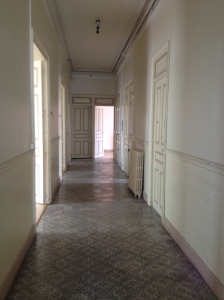 Tomorrow it will have been exactly one year since our container from St. Louis had arrived and we were beginning to move our furniture into our apartment. With our place being on what the French call the second floor, but to Americans is actually the third floor, those 54 steps up to our new abode were a challenge, but that was only the tip of the iceberg. One year ago.
Tomorrow it will have been exactly one year since our container from St. Louis had arrived and we were beginning to move our furniture into our apartment. With our place being on what the French call the second floor, but to Americans is actually the third floor, those 54 steps up to our new abode were a challenge, but that was only the tip of the iceberg. One year ago.  Sometimes I wonder where the time went, and other times I know exactly how each moment was spent. Since it hasn’t always been easy, sometimes I wonder how it’s only been a year. We were still in the midst of scrubbing walls, floors, doors, toilets, and sinks when our container arrived. It was exciting, yet frightening to finally enter the door and step into our new life in France. We’d opened the door to enter that corridor of relative homelessness when we’d left our home and friends in St. Louis two months prior. The corridor was familiar territory, not much different than spending two months on vacation in France as we had for the last 15 years. When the container arrived and we set up house and home in Béziers, started filling the cupboards and purchasing school supplies for the kids, the corridor disappeared, and porthole to a previous life had been sealed. It’s not a short term stay, we’re not ephemeral expats living out a dream to spend some time in France. This is our new home. That was one year ago.
Sometimes I wonder where the time went, and other times I know exactly how each moment was spent. Since it hasn’t always been easy, sometimes I wonder how it’s only been a year. We were still in the midst of scrubbing walls, floors, doors, toilets, and sinks when our container arrived. It was exciting, yet frightening to finally enter the door and step into our new life in France. We’d opened the door to enter that corridor of relative homelessness when we’d left our home and friends in St. Louis two months prior. The corridor was familiar territory, not much different than spending two months on vacation in France as we had for the last 15 years. When the container arrived and we set up house and home in Béziers, started filling the cupboards and purchasing school supplies for the kids, the corridor disappeared, and porthole to a previous life had been sealed. It’s not a short term stay, we’re not ephemeral expats living out a dream to spend some time in France. This is our new home. That was one year ago.
I’m a teacher, have always been a teacher. Of course I’d be teaching in France. The idea of teaching English in France frightened me a little, but annoyed me more than anything. “Tu devrais enseigner l’anglais à l’université”, “On m’a dit qu’ils cherchent une prof d’anglais par-ci et par-là.” Wonderful, thanks for your concern, but I’m not an English teacher. I’m a French teacher. I started thinking about that, long and hard. Why, I asked myself, would I consider doing something that I didn’t want to do at 41 years old? Didn’t I deserve more? I really love French, and love teaching it. That was when what I identify now as “the American in me” took over. I can do whatever I want to do, as long as I’m willing to work very hard, and not be intimidated by the threat of failure or having to teach myself how to do something new. 
 One year ago. I told myself that I could do it. I learned to ignore those who told me I couldn’t. I overcame my fear of telling French people that I’m going to teach French here. I started a new business in France. I became an English speaking French teacher in Béziers and on Skype. I told myself that I am good enough. I realized that I am. When I started writing this blog several years ago, I didn’t even want to tell my family and friends about it because I was embarrassed. I was sure my writing was bad, and that nobody would be interested. I didn’t tell my husband about it until I’d been writing for at least 6 months. When I started recording French lessons and putting them on a YouTube channel, nobody knew. They didn’t know because I didn’t tell them. I’m not sure why my self-esteem had dropped from the time I was a young 20-something, but during the last year and a half I have seen myself change. I see now that the greatest hurdle was telling myself that I am good at something, and learning to realize that people who don’t believe in me don’t have the final word on the matter. One year ago. I didn’t know I was good at much. Somewhere inside I guess I knew it, people had told me, but I didn’t believe it. This first year of living in France has taught me that I’m not good at everything (like stress management and not taking on too much for one sane person to handle). However, I’ve accepted that I’m a really good French teacher, and I’m good at meeting new friends. I’m a good mom, too. I’m good at taking on a challenge, and I’m good at learning new things. I guess the most important thing is that I’ve begun to accept myself, and I feel like I’ve made a new friend in me. Now I need to learn to trust my new friend. I think she cares about me more than anyone else can.
One year ago. I told myself that I could do it. I learned to ignore those who told me I couldn’t. I overcame my fear of telling French people that I’m going to teach French here. I started a new business in France. I became an English speaking French teacher in Béziers and on Skype. I told myself that I am good enough. I realized that I am. When I started writing this blog several years ago, I didn’t even want to tell my family and friends about it because I was embarrassed. I was sure my writing was bad, and that nobody would be interested. I didn’t tell my husband about it until I’d been writing for at least 6 months. When I started recording French lessons and putting them on a YouTube channel, nobody knew. They didn’t know because I didn’t tell them. I’m not sure why my self-esteem had dropped from the time I was a young 20-something, but during the last year and a half I have seen myself change. I see now that the greatest hurdle was telling myself that I am good at something, and learning to realize that people who don’t believe in me don’t have the final word on the matter. One year ago. I didn’t know I was good at much. Somewhere inside I guess I knew it, people had told me, but I didn’t believe it. This first year of living in France has taught me that I’m not good at everything (like stress management and not taking on too much for one sane person to handle). However, I’ve accepted that I’m a really good French teacher, and I’m good at meeting new friends. I’m a good mom, too. I’m good at taking on a challenge, and I’m good at learning new things. I guess the most important thing is that I’ve begun to accept myself, and I feel like I’ve made a new friend in me. Now I need to learn to trust my new friend. I think she cares about me more than anyone else can.







